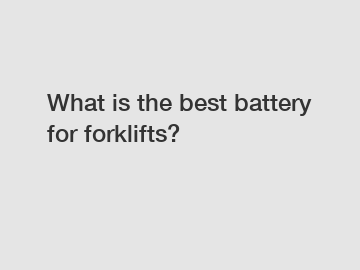Feb. 09, 2024
Electrical Equipment
What is the best battery for forklifts?
When it comes to choosing the best battery for forklifts, there are several factors to consider. Forklifts are used in various industries, such as warehousing, manufacturing, and construction, to lift and transport heavy loads. As a result, they require a reliable and efficient power source to ensure optimal performance. In this article, we will explore the different types of batteries available for forklifts and discuss their benefits and drawbacks.
1. Lead-Acid Batteries:

Lead-acid batteries have been a popular choice for forklifts for many years. They are cost-effective and offer a relatively long lifespan. These batteries use a chemical reaction between lead plates and sulfuric acid to produce electricity. Lead-acid batteries are known for their ability to provide consistent power over a long period. However, they require regular maintenance, including watering, equalizing, and cleaning of the battery cells. This maintenance can be time-consuming and may result in downtime for the forklift.
2. Lithium-Ion Batteries:
In recent years, lithium-ion batteries have gained popularity due to their numerous advantages. They are known for their high energy density, which means they have a higher capacity to store energy compared to other battery types. Lithium-ion batteries also have a longer lifespan and require minimal maintenance. They are quick to recharge and can be opportunity-charged, meaning they can be charged during short breaks without harming the battery life. However, the initial cost of lithium-ion batteries is higher compared to lead-acid batteries. Despite the higher upfront investment, the long-term benefits, such as reduced maintenance costs and increased productivity, make them an attractive option.
3. Fuel Cell Batteries:
Fuel cell batteries, also known as hydrogen fuel cell batteries, are an emerging technology in the forklift industry. These batteries generate electricity by combining hydrogen and oxygen, producing water and heat as byproducts. Fuel cell batteries offer zero-emission operation, making them environmentally friendly. They also provide longer runtimes compared to traditional batteries. However, fuel cell batteries are relatively expensive and require a dedicated infrastructure for hydrogen refueling. As a result, their adoption is still limited, but they hold great potential for the future of forklift power sources.
4. Comparison of Key Factors:
To determine the best battery for forklifts, it is essential to compare key factors such as lifespan, maintenance requirements, charging time, and environmental impact. Lead-acid batteries have a relatively lower upfront cost but require regular maintenance and watering. They have a lifespan of around 1,500 cycles. In contrast, lithium-ion batteries have a higher initial cost but offer a longer lifespan of up to 3,000 cycles or more. They require minimal maintenance and can be fast-charged, reducing downtime. Fuel cell batteries have a longer runtime but are expensive and require infrastructure for refueling.
In conclusion, the best battery for forklifts ultimately depends on the specific needs of the business. Lead-acid batteries are a reliable and cost-effective option for those with limited budgets. However, if long-term cost savings, reduced maintenance, and increased productivity are essential, lithium-ion batteries are the way to go. Fuel cell batteries are still developing but offer zero-emission operation and extended runtimes. As technology progresses, the choice of the best forklift battery will become more diverse, providing businesses with even more options to improve their operations.
If you want to learn more, please visit our website camel battery logo, lithium battery for rv use, camel group name.
Previous: What are the requirements for a dry type transformer?
Next: Is the Safety Limit Switch a Game-Changer in Industrial Automation?
If you are interested in sending in a Guest Blogger Submission,welcome to write for us!
All Comments ( 0 )